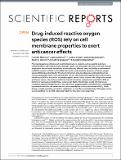Drug-induced reactive oxygen species (ROS) rely on cell membrane properties to exert anticancer effects
Author(s)
Molavian, Hamid R.; Goldman, Aaron; Phipps, Colin J.; Kohandel, Mohammad; Wouters, Bradly G.; Sengupta, Shiladitya; Sivaloganathan, Sivabal; ... Show more Show less
DownloadDrug-induced reactive.pdf (643.5Kb)
PUBLISHER_CC
Publisher with Creative Commons License
Creative Commons Attribution
Terms of use
Metadata
Show full item recordAbstract
Pharmacological concentrations of small molecule natural products, such as ascorbic acid, have exhibited distinct cell killing outcomes between cancer and normal cells whereby cancer cells undergo apoptosis or necrosis while normal cells are not adversely affected. Here, we develop a mathematical model for ascorbic acid that can be utilized as a tool to understand the dynamics of reactive oxygen species (ROS) induced cell death. We determine that not only do endogenous antioxidants such as catalase contribute to ROS-induced cell death, but also cell membrane properties play a critical role in the efficacy of ROS as a cytotoxic mechanism against cancer cells vs. normal cells. Using in vitro assays with breast cancer cells, we have confirmed that cell membrane properties are essential for ROS, in the form of hydrogen peroxide (H[subscript 2]O[subscript 2]), to induce cell death. Interestingly, we did not observe any correlation between intracellular H[subscript 2]O[subscript 2] and cell survival, suggesting that cell death by H[subscript 2]O[subscript 2] is triggered by interaction with the cell membrane and not necessarily due to intracellular levels of H[subscript 2]O[subscript 2]. These findings provide a putative mechanistic explanation for the efficacy and selectivity of therapies such as ascorbic acid that rely on ROS-induced cell death for their anti-tumor properties.
Date issued
2016-06Department
Harvard University--MIT Division of Health Sciences and TechnologyJournal
Scientific Reports
Publisher
Springer Nature
Citation
Molavian, Hamid R., Aaron Goldman, Colin J. Phipps, Mohammad Kohandel, Bradly G. Wouters, Shiladitya Sengupta, and Sivabal Sivaloganathan. “Drug-Induced Reactive Oxygen Species (ROS) Rely on Cell Membrane Properties to Exert Anticancer Effects.” Scientific Reports 6 (June 9, 2016): 27439.
Version: Final published version
ISSN
2045-2322